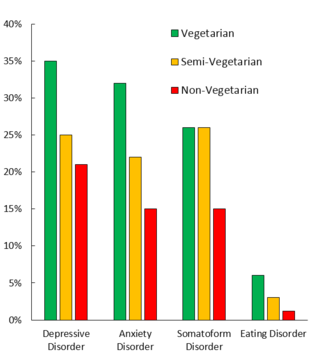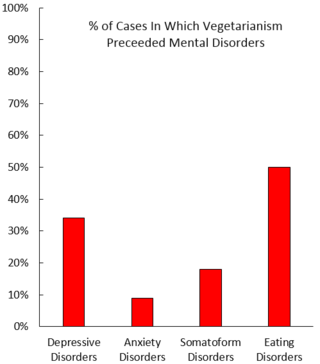Health
How Scary Are the Mental Health Risks of Vegetarianism?
How strong is the link between vegetarianism and mental illness?
Posted December 15, 2015

A headline in Women’s Health Magazine recently caught my attention: “The Scary Mental Health Risks of Going Meatless.” The headline made it sound like replacing the bacon and prime rib in your diet with tofu and seitan will make you mentally ill. I have previously written about the link between vegetarianism and eating disorders (see this post). But I’ve never argued that giving up animal flesh causes emotional problems, so I decided to check out the major study the headline was based on. What I found illustrates why you should not get your science news from flashy headlines and the problem of link-think in anthrozoology (the study of human-animal relationships).
The claim that going veg can make you crazy was based on a 2012 study which appeared in the International Journal of Behavioral Nutrition and Physical Activity. (Here is the actual journal article.) The research team, led by German psychologist Johannes Michalak, reanalyzed data from a 2002 epidemiological study that examined the physical and mental health of a large randomly selected sample of German adults (here).
A few studies have linked vegetarianism to poor mental health (e.g., here) and one study found vegetarians were psychologically better off than meat eaters (here). But all of these studies had methodological problems. The German study avoided the most common flaws in previous research. First, it involved a representative sample of over 4,000 individuals that included a wide range of ages (18 to 65). Second, mental health diagnoses were based on standardized clinical interviews that assessed for categories of psychiatric problems. These included depressive disorders, anxiety disorders, eating disorders, and somatoform disorders (mental illnesses that cause body symptoms such pain, hypochondria, and gastro-intestinal complaints.) Third, the researchers examined rates of psychiatric symptoms over three time periods – the previous month, the previous year, and over the subjects’ lifetimes. Finally, all the subjects were asked at what age any mental or physical health problems began and, if they were vegetarians, when they had decided not to eat meat.
The Subjects…
There were 4,181 subjects in the study. As expected, a small minority (1.3%) were “strict vegetarians,” with another 4.5% being “predominant vegetarians.” (I will call them semi-vegetarians). The vegetarians differed from the meat-eaters in several respects. They were more likely to be female, unmarried, younger, urban, and highly educated. All of these demographic factors are associated with both meat avoidance and with the prevalence of mental disorders. Women, for example, are more likely than men to be vegetarians, and women also suffer more from anxiety problems. The researchers, however, were interested in assessing mental illness among the vegetarians independently of factors such as sex, education, and marital status. Thus they controlled for demographic factors by selecting a subsample of 244 non-vegetarians that exactly matched the demographic profile of the 244 vegetarians and predominant vegetarians in the study.
Do Vegetarians Have More Psychological Problems?
The good news is that most of the vegetarians and the semi-vegetarians did not suffer from any of the four categories of mental illnesses.

The bad news is that vegetarians and semi-vegetarians were indeed more likely that non-vegetarians to suffer from all four of the categories of mental illnesses. (See the graph.) For example, vegetarians were twice as likely as non-vegetarians to have had an anxiety disorder and five times more likely to have suffered from an eating disorder. The frequency of mental illness among the semi-vegetarians generally fell between the vegetarians and the non-vegetarians.
The Problem: Cause or Effect?
The researchers found substantial links between vegetarianism and psychiatric illness. But does this support the claim of the Women’s Health Magazine headline – that giving up meat CAUSES mental illness? Not at all. The researchers pointed out three potential explanations of the connection between diet and mental disorders.
- Hypothesis 1: Vegetarians diets can cause poor mental health by affecting brain chemistry.
- Hypothesis 2: Psychological factors such as personality traits make some people prone to choose a vegetarian life style and also predisposes them to mental health problems.
- Hypothesis 3: The decision to give up meat is, in some cases, a consequence of a mental disorder, for example, hypochondria.
The researchers were able to test the validity of Hypothesis 1 - that vegetarianism causes mental illness. They did this by examining which came first – giving up meat or the emergence of psychiatric symptoms. Causes must precede their effects. Thus if Hypothesis 1 is true, mental illnesses in vegetarians should usually appear after the subjects stopped eating animals. This, however, was not the case. As shown

by this graph, among the vegetarians and semi-vegetarians with psychiatric diagnoses, their psychological problems generally preceded changes in their diet. (Eating disorders were the exception.) In short, the magazine headline was wrong. Indeed, the researchers concluded there was little evidence that vegetarianism causes mental illness.
Link-Think and Flashy Headlines
Link studies are starting to bug me. For example, the “link” between childhood animal cruelty and subsequent adult violence is weaker than most people think. (See this post.) And what are we to make of the study linking being a “dog person” with lower intelligence (here). Then there is the link between having a pet cat when you are kid and becoming schizophrenic (here). That fact is that most children who abuse animals become normal adults, and I don’t know any cat owners who are schizophrenic. And I am not buying the Women’s Health Magazine headline that screamed going veg causes mental illness.
Here is the take home message. Don’t believe all the big print headlines extolling the harms (or benefits) of our complex relationships with other species. And be especially wary of health claims that start with “The researchers found a link between...”
For more Animals and Us posts on the psychology of vegetarianism see here, here, here, here, and here.
Hal Herzog is professor of psychology at Western Carolina University.




